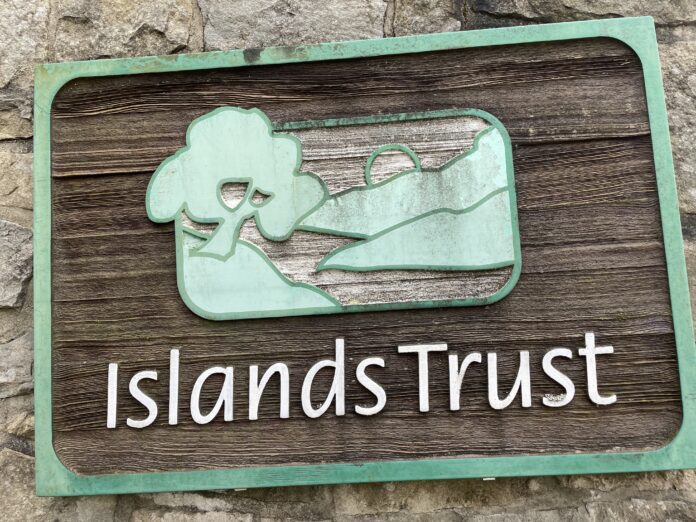A year-old drama from a Lasqueti Local Trust Committee (LTC) meeting may have ripple effects across the Islands Trust, as the land use authority’s Executive Committee (EC) met to consider limits on the public recording of committee meetings.
Recommendations on how to structure and implement those limits came during the EC’s meeting Wednesday, March 27, as Legislative Services director David Marlor brought back a report requested the previous year, stemming from events during a few “lively” Lasqueti LTC meetings held in early 2023.
The Lasqueti meetings were chaired by Gabriola Island trustee Tobi Elliott, who was confronted over comments she made suggesting if a member of the public wished to have a “collegial working relationship” with their elected officials, it would be respectful to ask permission to record them before doing so. One speaker bristled at the notion, cited the Criminal Code of Canada, and claimed an earlier committee chair had wrongly required advance permission to record — all of which led Elliott to introduce the topic to her fellow EC members later than month.
Some clarity was needed, she told the EC in 2023, particularly around “intent of use” — seemingly hoping to draw a distinction exempting someone recording for professional reasons. But the report returned last week simply offered a green light for limiting members of the public’s ability to record procedurally, despite a lack of legislation.
“You don’t have any bylaws that indicate whether or not people can record any meetings, and you have no policy,” said Marlor. “So really, the only control you have is that the chair does have the ability to control the meeting.”
Marlor said a meeting chair could take the time to let attendees know that “somebody wants to record personally” and that it was occurring — or take further steps, as the existing meeting procedure bylaws put responsibility for maintaining “order and decorum” during meetings upon the chair.
“You can also require that they record the committee, not other people,” said Marlor. “And if somebody speaking is uncomfortable with that recording, you can request the recording to be stopped.”
Marlor said staff are preparing a “script” for local committee chairs to read to that effect, although according to the report he prepared for the EC, staff recommend the chair “require” — not request — anyone making personal recordings “respect the wishes” of public speakers addressing committees who ask not to be recorded.
“Staff recommend that to address this, in the absence of a bylaw amendment or policy amendment, that the Chair posts a notice at the meeting location advising that the meeting is being live streamed and recorded,” according to Marlor’s report. “The notice can further state that those wishing to personally record the meeting (video or audio) must obtain the consent of the Chair in advance of doing so.”
The report cites the widely-reported “banning” of public recordings of council meetings in Lantzville in 2020, itself partially a response to a member of the public there livestreaming council meetings via social media. At the time, Lantzville did not stream video or audio of its meetings, although municipal staff did record them; the Islands Trust currently live-streams video and audio and makes recordings available online some weeks later.
“Local trust committees may, by resolution or bylaw, establish their own requirements for public recording of their meetings,” according to Marlor’s report. “The only requirement is that the local trust committees ensure that the meetings are open to the public, and this is satisfied by allowing the public into the meeting venue, to join the meeting on-line, or to watch the livestream. Limiting public recording of the meetings would not violate the open meeting requirements.”
EC chair Peter Luckham seemed uncomfortable with the idea of members of the public needing to gain consent from committee chairs before recording — although he agreed with considering constraints that might ask anyone recording to focus on meeting participants.
“Really, we’re not offering consent,” said Luckham. “It’s an open and free space, in which somebody can do what they wish. Do we need to say ‘consent’ or just have the notice state the chair must be advised that they intend on recording?”
Marlor said changing the language to advisory wouldn’t take away from a chair’s ability to then “have a discussion” with people about the rules they want to set up in a meeting.
“I just don’t want anybody to feel that we might say ‘no,’” said Luckham, “when it seems clear to me that we can’t really say no, we can just advise them.”
Elliott told staff she would need “absolute clarity” on the application of the Criminal Code on Islands Trust meeting procedures when the “script” for future LTC meetings returned.

